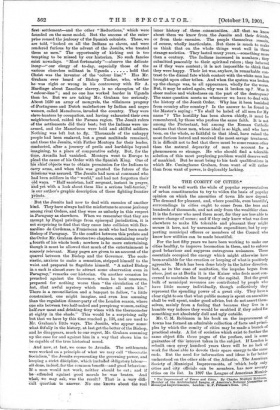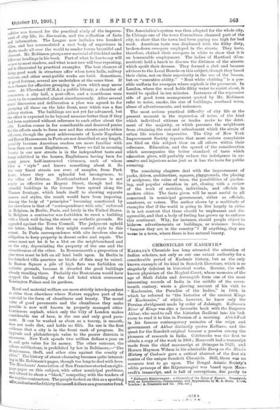THE COMITY OF CITIES.*
IT would be well worth the while of popular representatives of urban constituencies to try to widen the basis of popular opinion on which the amenities of town life now depend. The demand for pleasant, and, where possible, even beautiful, surroundings in cities ought to come from the tens and hundreds of thousands, and not only from the wealthier class. It is the former who need them most, for they are less able to secure change of scene ; and if they only knew what was done elsewhere to make life tolerable and pleasant they might secure it here, not by unreasonable expenditure, but by sup- porting municipal officers or members of the Council who know how utilities can be made beautiful.
For the last fifty years we have been working to make our cities healthy, to improve locomotion in them, and to enforce good behaviour and suppress outrageous nuisances. These essentials occupied the energy which might otherwise have been available for the creation or keeping of what is positively agreeable. Much has been done lately in the latter direction, but, as in the case of sanitation, the 'impulse began from above, just as at Berlin it is the Kaiser, who feels most con- cerned to maintain the beauty of the capital. But the great bulk of municipal revenues are contributed by people who have little money, individually, though 'collectively they represent the sending power of a great city. They haves clear right to see that what public money is spent on amenities shall be well spent, under good advice, but do not assert them- selves, mainly from a feeling that because they live in a humble way indoors they would be snubbed if they asked for something not absolutely dull and ugly outside. Mr. C. M. Robinson in his book on the improvement of towns has formed an admirable collection of facts and princi- ples by which the comity of cities may be made a branch of practical study. A list of societies which exist to further the same object fills three pages of the preface, and is some guarantee of tile interest taken in the subject. If London is rebuilt once elferY , hundred years there will be no lack of work for those' able to devote their spare energy to the same ends. But the need for information and ideas is far better understood on the other side of the Atlantic. The American Society of, Municipal Improvements, of which body only cities and 'city officials can be members, has now seventy cities on its list. In 1897 the League of American Muni& I° The :Improverneta of Towns and Cities. By Charles Mulford Robinson, Member of the Architectural League of America's National Committee op Municipal Improvements. Loudon : 0; P. rtitnam's Sons. [514] Alities was formed for the practical study of the improve. neat of city life, its discussion, and the collection of facts Lnd information. The League now includes two hundred aies, and has accumulated a vast body of experience in fforts made all over the world to render towns beautiful and aeasant. Mr. Robinson groups new material of this kind under iifferent headings in his book. Part of what he has to say will :e new to most readers, and what is not new will bear repeating, Ind is illustrated by practical examples. The best chances of Pang good work in structure offer when town balls, railway itations, and other semi-public works are built. Sometimes, ay good fortune, several are undertaken at the same time. If A a chance for effective grouping is given which may never recur. At Cleveland (U.S.A.) a public library, a chamber of :Amerce, a city hall, a post-office, and a courthouse were ibout to be constructed almost simultaneously. After several sears' discussion and deliberation a plan was agreed to for arouping all these on the lake front, near which was a fine railway station. The buildings are not yet far advanced, but the effect is expected to be beyond measure better than if they had been scattered without reference to each other about the city. London comes in for considerable and deserved praise for the efforts made to form new and fine streets and to widen old ones, though the great achievements of Louis Napoleon and Baron Haussmann in Paris are not described at any length, possibly because American readers are more familiar with them than are most Englishmen. Where we fail in securing itauty in our new streets is in the independent taste and iancy exhibited in the houses, Englishmen having been for many years half-instructed virtuosos, each of whom tikes a " style " and knows something about it. So the very finest streets are rowc of samples, from Park Lane, where they are splendid but incongruous, to the villas of Brixton. Northumberland Avenue is not nearly as effective as Regent Street, though had the ralendid buildings in the former been spread along the Thames frontage, which lends itself to showing separate masses and styles, the result would have been imposing. Among the body of " principles " becoming sanctioned by law elsewhere is that of " correspondence.with site," enforced in Belgium, in Berlin, Paris, and lately in the United States. In Belgium a contractor was forbidden to erect a building with a blank wall facing the street on msthetic grounds. He appealed against the Town Council. The judgment upheld the latter, holding that they might control style to this extent. In Paris correspondence with site involves also an obligation to keep property in decent order and repair. The owner must not let it be a blot on the neighbourhood and on the city, depreciating the property of the one and the attractiveness of the other. In Bournemouth a proportion of pine trees must be left on all land built upon. In Berlin in the detached villa quarters no blocks of fiats may be raised. In Boston Square a pile of high flats was forbidden on msthetic grounds, because it dwarfed the good buildings already standing there. Probably the Bostonians would have stopped the building of the tall hotel which overcrows 1Censington Palace and its gardens.
Moral and material welfare are mere strictly interdependent in cities than elsewhere where Nature supplies part of the material in the form of cleanliness and beauty. The moral value of good pavements and the cleanliness they make Possible is now well known in properly managed cities Continuous asphalt, which only the City of London makes considerable use of here, is the one and only good pave- ment. It can be washed as clean as a teacup, is smooth, does not make dirt, and holds no filth. Its use is the first evidence that a city is in the front rank of progress. Its hygienic and philanthropic value to the poorer districts is enorruous. New York spends two million dollars a year on
and gets value for its money. The other extreme, the Odious cobblestone, is prohibited by law in Baltimore,—" like drunkenness, theft, and other sins against the comity of cities." The history of street-cleansing becomes quite interest- ing in Mr. Robinson's pages, though too long to deal with here. The Merchants' Association of San Francisco started an eight- Page paper on this subject, with other municipal problems, and offered to Clean a "block," competing with the tenders of the re --, a
contractors. The people looked on this as a sporting O ffer, and s b 'bed thirty thousand dollars aa a guarantee fund. u scri The Association's system was then adopted for the whole city. In Chicago one of the town Committees cleansed part of the city, to show that the town had been paying too high for bad work. American taste was displeased with the filthy dirty, broken-down sweepers employed in the streets. They have, therefore, clothed their sweepers in white to show that it is an honourable employment. The ladies of Hartford (Con- necticut) held a lunch to discuss the dirtiness of the streets, which spoilt their dresses. They formed a club and became advisers to the Local Boards on this subject, though they based their claim, not on their superiority in the use of the broom, but on "executive ability." "Neat white clothing" is a pos- sible uniform for sweepers where asphalt is the pavement. In London, where the wood holds filthy water to squirt about, it would be spoiled in ten minutes. Instances of the repressive side of good town management quoted by Mr. Robinson refer to noise, smoke, the size of buildings, overhead wires, abuse of advertisements, and nuisances.
The most serious practical difficulty of city life at the present moment is the repression of noise, of the kind which individual citizens or trades make to the detri- ment of the majority, or which prevents the neighbours from obtaining the rest and refreshment which the strain of urban life renders imperative. The City of New York Improvement Society reports that more serious complaints are filed on this subject than on all others within their reference. Education, and the spread of the consideration which accompanies the better standard of taste which education gives, will probably reduce the indulgence in ex- aessive and injurious noise just as it has the taste for public swearing.
The remaining chapters deal with the improvement of parks, drives, architecture, squares, playgrounds, the placing of sculpture, the value of trees, the possibilities of garden- ing, and popular education in art, closing with a review of the work of societies, individuals, and officials in modern cities. The facts given will be most useful to all concerned in municipal government, either as officials, amateurs, or voters. The author shows by a multitude of examples that if the world is going to live largely in cities it is not content that these should be unpleasant and dis- agreeable, and that a body of feeling has grown up to enforce this sentiment. Why, for instance, should people object to hideoua advertisements or buildings, or nuisance trades, "because they are in the country " ? If anything, they are worse in a town, where there is less natural beauty.















































 Previous page
Previous page